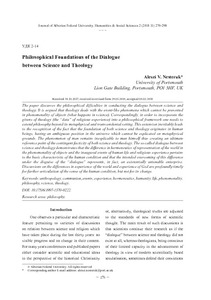Показать сокращенную информацию
Philosophical Foundations of the Dialogue between Science and Theology
| Автор | Nesteruk, Alexei V. | en |
| Автор | Нестерук, А.В. | ru_RU |
| Дата внесения | 2018-02-28T07:45:55Z | |
| Дата, когда ресурс стал доступен | 2018-02-28T07:45:55Z | |
| Дата публикации | 2018-02 | |
| URI (для ссылок/цитирований) | https://elib.sfu-kras.ru/handle/2311/70375 | |
| Аннотация | The paper discusses the philosophical difficulties in conducting the dialogue between science and theology. It is argued that theology deals with the event-like phenomena which cannot be presented in phenomenality of objects (what happens in science). Correspondingly, in order to incorporate the givens of theology (the “data” of religious experience) into a philosophical framework one needs to extend philosophy beyond its metaphysical and transcendental setting. This extension inevitably leads to the recognition of the fact that the foundation of both science and theology originates in human beings, having an ambiguous position in the universe which cannot be explicated on metaphysical grounds. The phenomenon of man remains inexplicable to man himself thus creating an ultimate reference point of the contingent facticity of both science and theology. The so called dialogue between science and theology demonstrates that the difference in hermeneutics of representation of the world in the phenomenality of objects and the inaugural events of human life and religious experience pertains to the basic characteristic of the human condition and that the intended overcoming of this difference under the disguise of the “dialogue” represents, in fact, an existentially untenable enterprise. Discussions on the differences in experience of the world and experience of God are profoundly timely for further articulation of the sense of the human condition, but not for its change | en |
| Аннотация | В статье обсуждаются философские трудности осуществления диалога между наукой и богословием. Богословие имеет дело с явлениями типа событий, к которым неприменимы критерии метафизики и онтологии. Таким образом, философия, осуществляющая посредничество между наукой и богословием, вынуждена включать в свой объем необъективируемые феномены, как рождение человека, любовь другого, ощущение своей плоти как единосущной всей вселенной, переживание событий Библейской истории и др. Расширение философии возможно, если включить в состав ее данного содержание опыта богообщения, опосредованного эпистемологическими критериями расширенной «рациональности», исходящей из абсолютного приоритета загадочности человека, его сознания и жизни вообще. Такое расширение философии, предполагающее отказ от трансцендентальной установки, выводит ее в принципиально эмпирическую сферу, отбрасывая в сторону исходный вопрос о том, что может быть исследовано, а что нет. Различие между научным опытом и опытом религиозным в философских терминах показывает, что это различие является базовой характеристикой человеческого состояния, и его преодоление под видом «диалога» является экзистенциально несостоятельным предприятием. Обсуждения различия в опыте мира и опыте Бога необходимы для дальнейшей артикуляции смысла человеческого состояния, но не его изменения | ru_RU |
| Язык | en | en |
| Издатель | Сибирский федеральный университет. Siberian Federal University | en |
| Тема | anthropology | en |
| Тема | communion | en |
| Тема | events | en |
| Тема | experience | en |
| Тема | hermeneutics | en |
| Тема | humanity | en |
| Тема | life | en |
| Тема | phenomenality | en |
| Тема | philosophy | en |
| Тема | science | en |
| Тема | theology | en |
| Тема | антропология | ru_RU |
| Тема | богословие | ru_RU |
| Тема | герменевтика | ru_RU |
| Тема | жизнь | ru_RU |
| Тема | наука | ru_RU |
| Тема | опыт | ru_RU |
| Тема | событие | ru_RU |
| Тема | сопричастие | ru_RU |
| Тема | феноменальность, | ru_RU |
| Тема | философия | ru_RU |
| Тема | человек | ru_RU |
| Название | Philosophical Foundations of the Dialogue between Science and Theology | en |
| Альтернативное название | Философские основания диалога между наукой и богословием | ru_RU |
| Тип | Journal Article | en |
| Контакты автора | Nesteruk, Alexei V.: University of Portsmouth Lion Gate Building, Portsmouth, PO1 3HF, UK; alexei.nesteruk@port.ac.uk | en |
| Контакты автора | Нестерук, А.В.: Университет Портсмута Англия, PO1 3HF, Портсмут, корпус Лайон Гэйт | ru_RU |
| Страницы | 276-298 | ru_RU |
| Журнал | Журнал Сибирского федерального университета. Гуманитарные науки. Journal of Siberian Federal University. Humanities & Social Sciences;2018 11 (2) | en |

